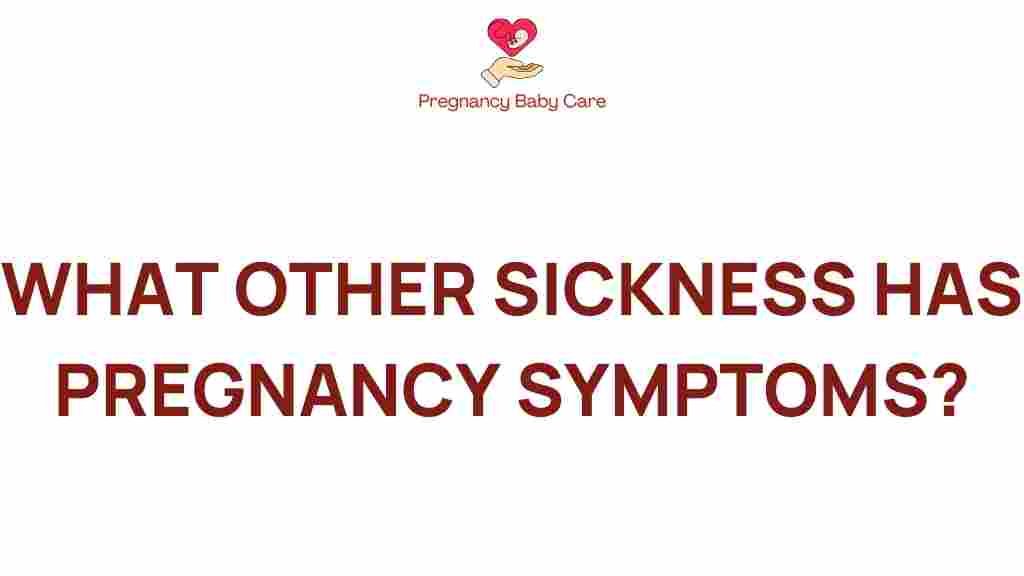Unmasking Pregnancy Symptoms: What Other Illnesses Mimic Its Symptoms?
Pregnancy is often a time filled with joy and anticipation, but it can also bring about a range of physical changes and symptoms that may lead to confusion. For many women, the symptoms of early pregnancy can mimic those of other medical conditions. Understanding these symptoms is crucial for proper diagnosis and treatment. This article aims to shed light on the various illnesses that can resemble pregnancy symptoms, emphasizing the importance of awareness in women’s health.
Understanding Pregnancy Symptoms
Pregnancy symptoms can vary widely from woman to woman and may include:
- Missed period
- Nausea and vomiting
- Fatigue
- Breast tenderness
- Frequent urination
- Food cravings or aversions
- Emotional changes
While these signs are commonly associated with pregnancy, they can also indicate other health conditions. Being aware of these overlapping symptoms is essential for accurate diagnosis and effective management of one’s health.
Common Illnesses That Mimic Pregnancy Symptoms
Here are some medical conditions that can present symptoms similar to those experienced during pregnancy:
1. Hormonal Imbalances
Hormonal fluctuations can lead to a variety of symptoms that are often confused with pregnancy signs.
- Polycystic Ovary Syndrome (PCOS): Women with PCOS may experience irregular periods, weight gain, and fatigue.
- Thyroid Disorders: Hypothyroidism or hyperthyroidism can cause changes in menstrual cycles, fatigue, and weight changes.
2. Gastrointestinal Disorders
Gastrointestinal issues can mimic pregnancy symptoms, particularly nausea and vomiting.
- Gastroenteritis: This viral or bacterial infection can cause nausea, vomiting, and diarrhea.
- Food Intolerances: Lactose intolerance or gluten sensitivity can lead to bloating, nausea, and abdominal discomfort.
3. Stress and Anxiety
Psychological conditions can manifest physical symptoms that resemble those of pregnancy.
- Stress: High levels of stress can lead to fatigue, changes in appetite, and even missed periods.
- Anxiety Disorders: Symptoms such as nausea, fatigue, and emotional fluctuations can occur.
4. Other Medical Conditions
Several other medical conditions can present signs similar to pregnancy:
- Urinary Tract Infections (UTIs): Symptoms can include frequent urination and abdominal discomfort.
- Endometriosis: This condition can cause severe menstrual cramps, nausea, and bloating.
- Premenstrual Syndrome (PMS): PMS can lead to symptoms such as breast tenderness, fatigue, and mood swings.
Diagnosis: How to Differentiate Between Pregnancy and Other Illnesses
When experiencing symptoms that could be associated with pregnancy or other health issues, it is essential to seek medical advice for accurate diagnosis. Here’s a step-by-step process to help with the diagnosis:
Step 1: Self-Assessment
Begin by assessing your symptoms:
- Keep a journal of your symptoms and any changes in your body.
- Note the timing and duration of your symptoms.
- Consider any recent lifestyle changes or stressors.
Step 2: Take a Pregnancy Test
If pregnancy is a possibility, taking a home pregnancy test can provide initial guidance. These tests are most accurate when taken after a missed period.
Step 3: Consult a Healthcare Provider
Regardless of the result, consulting a healthcare provider is crucial for further evaluation. They may perform:
- Blood tests to confirm pregnancy or check hormone levels.
- Ultrasound to visualize reproductive organs.
- Additional tests based on your symptoms to rule out other medical conditions.
Step 4: Follow-Up and Monitoring
Depending on the diagnosis, your healthcare provider will outline a treatment plan. Follow-up appointments may be necessary to monitor your condition.
Troubleshooting Tips for Managing Symptoms
While awaiting a diagnosis, here are some tips to manage overlapping symptoms:
- Stay Hydrated: Drink plenty of water to help alleviate nausea and fatigue.
- Maintain a Balanced Diet: Eating small, frequent meals can help manage gastrointestinal symptoms.
- Practice Stress-Relief Techniques: Yoga, meditation, and deep-breathing exercises can help with anxiety.
- Track Your Symptoms: Keeping a log can help you identify patterns and provide your healthcare provider with valuable information.
Awareness in Women’s Health
Increased awareness of the symptoms that overlap between pregnancy and other illnesses is essential for women’s health. Understanding these conditions can aid in timely diagnosis and treatment. Here are some points to consider:
- Educate Yourself: Knowledge about various medical conditions can empower you to make informed health decisions.
- Regular Check-Ups: Routine visits to your healthcare provider can help monitor your health and catch any issues early.
- Advocate for Your Health: If your symptoms are persistent or concerning, don’t hesitate to seek a second opinion.
Conclusion
While pregnancy symptoms can be exciting, they can also overlap with various medical conditions, leading to confusion and misdiagnosis. By understanding and recognizing these symptoms, women can take proactive steps in managing their health. Whether it’s hormonal imbalances, gastrointestinal disorders, or psychological factors, awareness is key. Always consult with a healthcare provider for an accurate diagnosis and tailored treatment plan. For more information on women’s health issues, consider visiting this resource.
In the journey of health and wellness, being informed and aware is your best ally.
This article is in the category Health and created by PregnancyBabyCare Team
